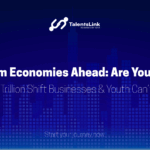Freelancing as a Career: The Skills Young Professionals Can’t Ignore
For decades, the definition of a “career” was simple: you studied, got a job in an office or company, and worked your way up. Stability and predictability were the goals. But today, that model is shifting and fast. More young professionals in Albania and across the world are exploring freelancing and gig opportunities not just as side hustles, but as legitimate career paths.
This shift raises a critical question: are young people actually prepared for the realities of the gig economy? And even more importantly, are we as educators, institutions, and companies doing enough to equip them with the right skills?
The Rise of the Gig Economy
The gig economy, which is work-based on short-term contracts, freelance projects, and flexible engagements, is not a trend. It’s becoming the norm. From design and marketing to IT development and digital consulting, platforms like Upwork, Fiverr, and even LinkedIn itself have globalized opportunities in ways unimaginable just ten years ago.
In Albania, we’re already seeing thousands of young professionals tap into these platforms, using their language skills, tech know-how, and creativity to serve international clients. For many, freelancing is no longer “extra money”—it’s the main source of income.
But here’s the catch: freelancing is not easier than traditional jobs. It often demands more responsibility, more adaptability, and a wider set of skills.
Self-Management: Being Your Own Boss
In a traditional job, you have managers, supervisors, and structures to guide you. In freelancing, you are the company. That means self-management, discipline, and reliability are no longer “nice to have” skills: they’re survival skills.
Clients don’t just buy your technical expertise. They buy your ability to deliver on time, communicate clearly, and manage projects independently. Without strong organizational habits, even the most talented freelancer can lose clients quickly.
Digital Literacy: The New Resume
Freelancers live online. Their reputation is built on platforms, portfolios, and personal branding. That’s why digital literacy is no longer just about knowing Word or Excel—it’s about mastering collaboration tools, understanding cybersecurity basics, managing online payments, and showcasing skills in a way that stands out globally.
Young professionals who treat LinkedIn as a digital CV, who can build an online presence through content or portfolios, and who stay updated with emerging tools will always have a competitive edge. In many ways, your profile is now your business card, your office, and your storefront—all in one.
Communication & Soft Skills: Trust Is the Currency
Freelancing is global. A young Albanian freelancer might be working with a client in Germany today, a startup in the U.S. tomorrow, and a company in the Middle East next month. The one thing that ties these relationships together is trust and trust is built through communication.
Clear writing, professional behavior, and cross-cultural sensitivity are vital. Freelancers don’t have HR teams to back them up: they are the HR. Every email, every Zoom call, and every contract is an opportunity to either build credibility or lose it.
Curiosity and Lifelong Learning: Adapting to Change
Perhaps the most underrated skill for freelancers is curiosity. AI, automation, and digital platforms are changing so quickly that what’s in demand today may be outdated tomorrow. The freelancers who thrive are those who constantly learn taking online courses, experimenting with new tools, and staying curious about how their industry is evolving.
As Professor Han Shen Lin from NYU Shanghai said about the future of students: humility and curiosity separate the best from the rest. The same holds true for freelancers. In fact, in the gig economy, curiosity is not just an asset it’s oxygen.
Green & Ethical Skills: The Hidden Differentiator
Today’s global clients care about more than just price. Many prefer to work with professionals who align with values like sustainability, inclusion, and ethical practices. This is where young Albanian freelancers can shine. By understanding green skills, showing awareness of social impact, and working transparently, freelancers don’t just compete—they stand out.
Why This Matters for Albania
Here’s the real debate: should freelancing be considered a serious career path in Albania?
For years, young people believed success meant leaving the country or getting a stable job in a traditional company. But now, digital platforms have created a world where talent in Tirana, Shkodër, or Vlora can compete globally without leaving home.
At TalentsLink, we see more and more youth asking about freelancing opportunities not as a backup, but as their main career strategy. And this makes sense: freelancing builds independence, exposes them to international standards, and develops exactly the kind of future-ready skills companies now demand.
The danger, however, is that too many young people step into freelancing unprepared. Without self-management, digital literacy, strong communication, and continuous learning, freelancing can feel unstable and overwhelming.
Final Thought
The gig economy is here to stay. The real question isn’t whether young people will embrace it:it’s whether we’re preparing them to succeed in it.
At TalentsLink, we believe in helping youth not only find opportunities but also build the skills—digital, soft, and green that will allow them to thrive in a flexible, global job market.
Because freelancing isn’t just a side hustle anymore. For many, it’s the new career. And if approached with the right mindset and skills, it can be a career that’s just as rewarding if not more than the traditional 9-to-5.

